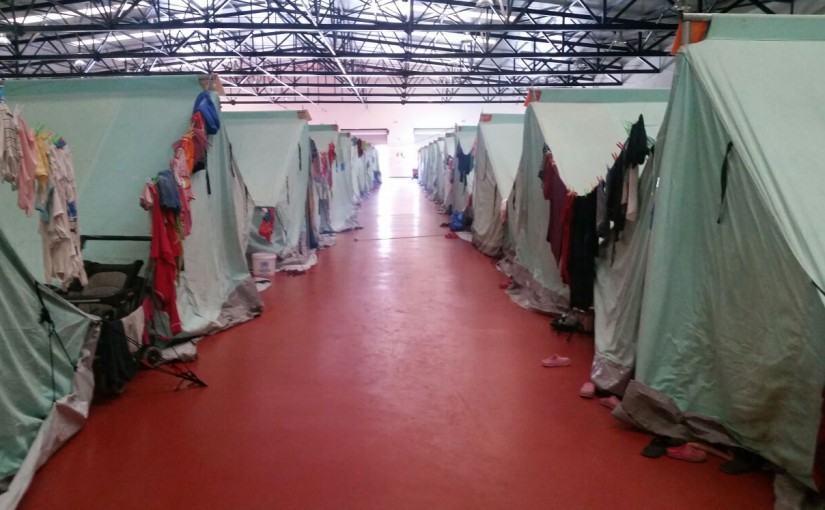humanitarian work, Overseas, Overseas coming and going, volunteering abroad
From Kensington to Thessaloniki: A week as a refugee doctor in Greece
Like so many of you, I have watched the News over the past few months and
been appalled by the atrocities going on around the world.
In the last five years of civil war in Syria, over two hundred and fifty thousand
people have lost their lives, and nearly five million have had to flee – most of
them are women and children.
We have seen and heard of horrifying footage of mass killings, chemical warfare
against civilians, indiscriminate bombing, sexual violence and beheadings. And
the harrowing images of refugees drowning in the Mediterranean, in a desperate
attempt to reach safer shores, are difficult to forget.
I decided to use my skills as a doctor to help.
The idea of volunteering abroad can seem intimidating in the face of long
commitment times required by some of the more well-known NGOs. However
there are many organisations that accept those with only a short period of time
to donate, typically one or two weeks.
I worked with two charities – The Syrian American Medical Society (SAMS) for
medical work and Salaam Cultural Museum (SCM) for humanitarian work. The
enrolment process is quick and simple; I received response from both
organisations within 24 hours of expressing my interest and attaching basic
documents (C.V., degree certificate, CRB check etc) via email. I was sent a
comprehensive guide on what to do and what to expect.
As a volunteer you pay for your own costs – flights to Thessoloniki, Greece, are
relatively cheap, accommodation in a 4 star hotel is heavily discounted for
volunteers, and food is also reasonably priced. You will find the Greeks treat you
with kindness and generosity, demonstrating their gratitude for your work.
I was based between three refugee camps on the outskirts of the city –
Frakapoor, Karamanlis and Iliadis, each with a population of approximately five
hundred inhabitants. The refugees live in makeshift homes, in the form of small
tents. Each tent houses at least one family so, as you can imagine, the living
conditions are incredibly cramped. Despite this, it was humbling to see how
some made it their home, displaying knitted rugs inside and tiny potted plants at
the tent ‘door’.
There is one clinic at each of the camps. Each ideally has two doctors, one
triaging nurse and a translator for all non-Arabic speakers – but actual numbers
vary depending on how many volunteer that week.
The working day starts at 9am with a morning meeting, and surgery finishes at
7pm. Clinically the work is the ‘bread-and- butter’ of UK general practice, and you
won’t feel out of your depth in terms of knowledge or experience. We, arguably,
have the perfect skill-set for this job.
Despite this relative advantage, the work is undeniably physically and
emotionally draining. I saw up to fifty patients per day. Each with their own
heart-wrenching story. Despair, bereavement, poverty, hunger and fear are
endemic, and the hardships ongoing.
An additional challenge is that the Syrian healthcare system is very different.
General Practice does not exist in Syria, and managing patient expectations was
tough, especially with the already overstretched Greek system. Many feared they
were receiving a sub-standard quality of care because they are refugees, and
there were some who believed us to be ‘experimenting’ on them. These patients
have first-hand experience of the fragility of life, and are understandably hyper-
vigilant when it comes to their health.
Seeing malnourished children and a population in dire straits, I realised that
medical aid is only a part of what these refugees need. I chose to also participate
in humanitarian work – which included labouring behind the scenes in the
warehouse, distributing food, and teaching in the makeshift camp schools. This
was an optional add-on to my primary role as doctor.
There are many benefits of getting involved with a project like this. Besides
helping those in need, this short trip enriched my experience and abilities as a
clinician. On numerous occasions I had to ‘think outside the box’ and find
innovative ways to implement management plans despite limited resources. My
capacity to mutli-task was also tested, as my role included calculating doses,
drawing up and dispensing drugs. Fortunately, clinical activity was fully covered
by my medical indemnity, free of charge.
I worked in a fantastic multi-disciplinary team of international colleagues; the
sense of camaraderie in this environment is unparalleled. I have, undoubtedly,
made some lifelong friends.
In short, I would highly recommend participating in such a project – it will be a
week well spent. As one child-refugee succinctly puts it, ‘We need you.’


